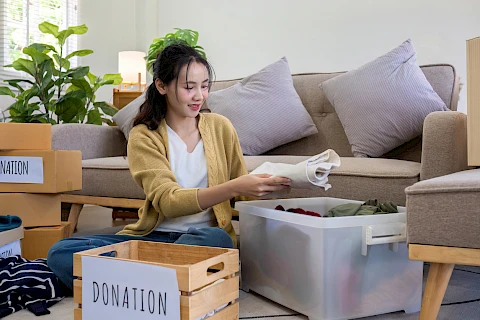
Decluttering can be a transformative process, especially for seniors. A tidy home not only enhances safety but also promotes better mental health. As a caregiver, you play a vital role in guiding and assisting seniors through the decluttering process. Your support can make a significant difference in creating a safer, more organized living environment that benefits their well-being.
The Emotional Attachment to Possessions
Seniors often have strong emotional connections to their belongings. These items can invoke memories and serve as tangible links to the past. When approaching decluttering, always acknowledge these emotional ties.
Approach conversations about decluttering with empathy. Ask open-ended questions and listen actively to understand their attachment to certain items. Empower seniors by involving them in the decisions. Encourage them to set the pace, choosing what stays and goes to foster a sense of control and respect their autonomy. Work together to prioritize items that hold the most while finding thoughtful ways to part with the rest.
Room-by-Room Decluttering Strategies
Tackling decluttering room by room makes the process more manageable. It allows you to focus on smaller, defined areas at a time, reducing overwhelm and helping maintain a steady pace throughout the process.
Living Room
The living room is often the heart of the home. Create dedicated spaces for remote controls, magazines, and other frequently used items. Ensure walkways are clear by removing excess furniture or items that may cause trips or falls.
Bedroom
A peaceful bedroom can significantly impact sleep quality. Maximize storage in closets by using hanging organizers and shelves. Consider donating clothes that the senior has not worn in years to create space. Ensure there's a clear path to the bed to prevent accidents and allow easy access during nighttime.
Kitchen
A well-organized kitchen improves safety and efficiency. Store items in stacked order and by frequency of use, keeping essentials within easy reach. Place everyday dishes and utensils on lower shelves to minimize bending or reaching.
Bathroom
The bathroom is a high-risk area for slips and falls. Remove unnecessary items to prevent clutter and keep pathways clear. Organize toiletries in accessible storage. Regularly check for expired products and dispose of them safely to maintain a clean and safe environment.
Organizing After Decluttering
Once decluttering is complete, focus on organizing what's left. Group similar items together and label boxes or containers for easy identification. Use clear bins, over-the-door organizers, or under-bed storage to keep items accessible and organized, ensuring seniors can easily find what they need without unnecessary strain. Regularly tidying the home can prevent clutter from building up, making daily living safer and more comfortable for seniors.
The Benefits of a Clutter-Free Space
A clutter-free environment offers multiple advantages that can enhance a senior's quality of life. Reduced clutter decreases the risk of tripping and falling. Clear spaces are easier to navigate, especially for those using mobility aids. Organization and cleanliness can alleviate stress and create a sense of calm and control. Many seniors, once the clutter is gone, feel a revived sense of energy and improved mood.
Senior Helpers Can Assist with Light Housekeeping and More
Decluttering results in a more organized, accessible, and peaceful living space for seniors, enhancing their quality of life. If you need more support caring for a senior loved one in Bryan, Conroe, College Station, Livingston, or Huntsville, we can help. Senior Helpers Bryan-CollegeStation-TX provides tailored senior home care and support, from assistance with daily living tasks to light housekeeping and more. Contact us today for more information!